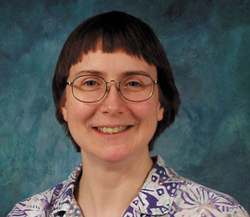 NOTE: This profile is part of a series highlighting the 25 researchers who were named UNMC Distinguished Scientists for 2006. Each of these researchers will be profiled in UNMC Today leading up to a March 12 ceremony to recognize their achievements.
NOTE: This profile is part of a series highlighting the 25 researchers who were named UNMC Distinguished Scientists for 2006. Each of these researchers will be profiled in UNMC Today leading up to a March 12 ceremony to recognize their achievements.
- Name: Joyce Solheim, Ph.D.
- Title: Associate professor, Eppley Institute
- Joined UNMC: 1999
- Hometown: Gilman City, Mo.
Q) Describe your research in 25 words or less.
A) My lab studies the regulation of immune responses and develops new approaches to cancer treatment that are based on the immune system.
Q) When did you realize you were interested in research?
A) My undergraduate degree was in clinical laboratory science, but after working in a clinical lab for a few years I married and moved to another city because of my husband’s position. There, I applied for both clinical and research lab positions. The first job I was offered was in an immunology lab at a university and once I took the job I found immunology research to be very interesting. It appeals to me that immunology research has such broad potential for improving medical care — for developing new therapies for cancer, infectious diseases, autoimmune syndromes, graft rejection and more.
Q) What are the greatest challenges in research today?
A) The greatest challenges for individual research investigators are to maintain the insight and flexibility to take new directions when appropriate and to educate the public about research, which will assist in their understanding and support of it.
Q) Best advice for new researchers?
A) Seek to write manuscripts and grant applications that are clear and persuasive.
Q) When an experiment stalls, what drives you to continue on?
A) Sometimes getting the result from a particular experiment is crucial to achieve a larger research goal, but sometimes the experimental approach can be changed or the question can be asked from a different angle. I ‘m always optimistic that there’s a way the final goal can be reached.
Q) Who has been your greatest teacher?
A) My parents taught me the things that are most important to me in science, as well as in the other aspects of my life: to see what’s good and interesting in the world and to try to do the best I can.
Q) Tell us about your family and hobbies outside the lab.
A) My husband is a writer (he writes children’s books) and we have two children. Some of my current hobbies are learning about the pioneers with my fourth-grader and reading Dr. Seuss books with my 5-year-old.
Q) Globally, describe the most notable research achievement ever?
A) There have been many notable research achievements and I think every scientist has made valuable contributions to what we know and understand. We all follow up on what someone has discovered before us.
Q) Clarify a common misconception about research?
A) Many people don’t comprehend how lengthy, pitfall-strewn and expensive research is. It’s a difficult enterprise.
Q) What would you tell a student interested in a research career?
A) If you’re inclined to work hard, think about your work and take responsibility, you have important ingredients for entering a research career. Graduate education is guided by the mentor, but the student should be prepared early on to begin to think independently about the direction of his or her research. Becoming a scientist means evaluating your own findings and publications by others and synthesizing all those results to establish your own unique experimental plans.
Q) List three things few people know about you.
- I have five brothers and sisters.
- All of us obtained our undergraduate degrees from Northwest Missouri State University.
- All of us except one (my younger brother, who is a lawyer) became educators.